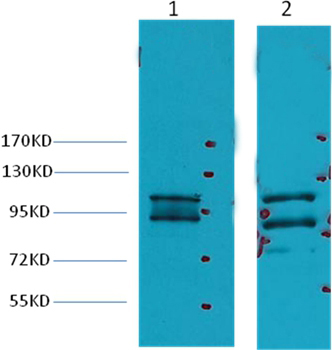

| WB | 咨询技术 | Human,Mouse,Rat |
| IF | 咨询技术 | Human,Mouse,Rat |
| IHC | 1/50-300 | Human,Mouse,Rat |
| ICC | 1/200 | Human,Mouse,Rat |
| FCM | 咨询技术 | Human,Mouse,Rat |
| Elisa | 咨询技术 | Human,Mouse,Rat |
| WB Predicted band size | 118kDa |
| Host/Isotype | Mouse IgG1 |
| Antibody Type | Primary antibody |
| Storage | Store at 4°C short term. Aliquot and store at -20°C long term. Avoid freeze/thaw cycles. |
| Species Reactivity | Human |
| Formulation | Purified antibody in PBS with 0.05% sodium azide and 50% glycerol. |
+ +
以下是关于Insulin Degrading Enzyme (IDE)小鼠抗体的3篇参考文献,包含文献名称、作者及摘要概述:
---
1. **"Insulin-degrading enzyme regulates the levels of insulin, amyloid β-protein, and the β-amyloid precursor protein intracellular domain in vivo"**
*Authors: Farris W, Mansourian S, Leissring MA, et al.*
**摘要**:本研究利用小鼠单克隆抗体检测IDE在脑组织中的表达,发现IDE通过降解胰岛素和β-淀粉样蛋白调控代谢及阿尔茨海默病相关病理,抗体特异性验证显示其在Western blot和免疫组化中的有效性。
2. **"Subcellular localization and expression patterns of insulin-degrading enzyme in neuronal and non-neuronal cells"**
*Authors: Vepsäläinen S, Hiltunen M, Helisalmi S, et al.*
**摘要**:通过小鼠多克隆抗体进行免疫荧光和亚细胞分离实验,揭示IDE在神经元中的胞质和线粒体分布,提示其可能参与细胞能量代谢调控。
3. **"Role of insulin-degrading enzyme in the clearance of extracellular insulin in vivo"**
*Authors: Miller BC, Anekonda TS, Craske ML, et al.*
**摘要**:使用小鼠单克隆抗体阻断IDE活性,证实其在胰岛素代谢中的核心作用,并发现IDE缺失导致小鼠血糖调节异常,抗体特异性验证支持其在体内外实验的应用。
---
以上文献聚焦于IDE抗体的开发、验证及其在代谢和神经退行性疾病研究中的应用。如需具体引用格式或更多文献,可进一步补充数据库检索结果。
Insulin-degrading enzyme (IDE) is a zinc-metalloprotease that plays a critical role in regulating cellular levels of insulin and amyloid-β (Aβ), a peptide implicated in Alzheimer’s disease. Primarily localized in the cytoplasm and secreted extracellularly, IDE is involved in glucose homeostasis, proteasomal degradation, and clearance of pathogenic peptides. Its dysfunction has been linked to type 2 diabetes and neurodegenerative disorders.
Mouse-derived IDE antibodies are immunological tools specifically developed to detect and quantify IDE expression in murine models. These antibodies are typically generated by immunizing mice with purified recombinant IDE protein or peptide epitopes unique to the murine IDE sequence. Validated for applications like Western blotting, immunohistochemistry, and immunofluorescence, they enable researchers to study IDE’s tissue distribution, expression changes under pathological conditions (e.g., diabetes or Alzheimer’s disease models), and interactions with substrates.
Many IDE mouse antibodies are monoclonal, ensuring high specificity and batch-to-batch consistency. Controls, such as IDE-knockout mouse tissues, are often used to confirm antibody specificity. These reagents are pivotal in elucidating IDE’s dual role in metabolic and neurological pathways, aiding drug discovery efforts targeting IDE for therapeutic intervention. Proper validation and species reactivity confirmation (e.g., mouse-specific vs. cross-reactive) are essential to avoid off-target effects in experimental outcomes.
×